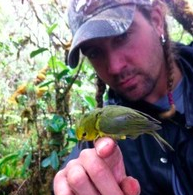Nathan C. Nieto, Principal Investigator
|
email: [email protected]
|
Dr. Nieto is an Associate Professor in the Department of Biological Sciences at Northern Arizona University. He has led multiple research projects involving the identification, experimentation and evaluation of infectious disease dynamics in reservoir hosts and commonly uses techniques in statistical modeling and animal models of pathogenesis. This has spanned many systems including bacterial/rickettsial, fungal, and most recently viral pathogens. Dr. Nieto has worked with dangerous pathogens in the laboratory and wildlife settings that include BSL and ABSL-3 level biosafety conditions. He has extensive experience working on animal models of infectious disease, as well as reservoir and vector competence experimentation. He has published 43 manuscripts thus far that include a large diversity of reservoir host systems from frogs and snakes to mammals, and especially tick-borne diseases. Experimental studies included experimental infection and molecular diagnostics to identify laboratory infection kinetics that are then used in sylvatic systems to describe the maintenance of pathogens in wild systems. Dr. Nieto is committed to using basic scientific research in a translational way in hopes of improving public health capacity.
|
Zachary Barrand, Master Student 2019-present
|
email: [email protected]
|
As an undergraduate researcher, Zach was recently awarded Northern Arizona University’s Hooper Undergraduate Research Award. As a masters student, Zach's research interests include co-infections and phylogenetic diversity of tick-borne co-infections.
|
Tanner Porter, Master Student 2017-present
|
email: [email protected]
|
Tanner is a second-year master’s student. His research focuses on Borrelia genospecies co-infections in ticks and analysis associated with the Free Tick Testing Program. In his free-time he serves on the board of the Kachina Peaks Avalanche Center, a non-profit that focuses on avalanche awareness and winter recreation education. Tanner hopes to continue working with vector-borne disease after he completes his master’s degree.
|
Molly Bechtel, PhD Candidate 2016-present
|
email: [email protected]
website: mjbechtel.weebly.com |
Molly completed her master’s degree studying bighorn sheep in central Nevada at the University of Nevada, Reno. After she graduated with a master’s degree she worked as a tortoise biologist with the United States Geological Survey, which inspired her current research. Her research in the Nieto lab focuses on tick-borne disease in desert tortoises and how ticks and disease interact with the Mojave Desert burrow ecosystem and public health. In her free time, she founded and volunteers with the Northern Arizona Association for Women in STEM, a non-profit, which advocates for equal representation for women in the sciences. Molly plans to continue researching interactions of wildlife and disease ecology with public health either as a government researcher or in academia.
|
Ryan Ward, PhD Student 2016-present
|
email: [email protected]
|
Ryan is a PhD student interested in community related hospital acquired infections in the Northern Arizona area.
|
Pete Motyka, PhD Candidate 2017-present
|
email: [email protected]
|
Pete is a PhD student studying Borrelia and the role birds play in the spread of ticks and disease throughout the west. Pete is interested in modeling relationships between wildlife ecology and tick-borne disease using a variety of statistical and geographical information tools.
|
Paul Phillips, PhD Student 2017-present
|
email: [email protected]
|
Paul completed his master’s degree in chemistry and biochemistry at Boise State. He is currently interested in the effects of antimicrobial compounds on ESKAPE pathogens.
|
Undergraduate Researchers
Zahraa Hmood 2018-present
|
Zahraa’s research interests include tick-borne diseases in endangered species. Currently, she is working to identify tick-borne pathogens in endangered fox populations. Zahraa is planning on attending medical school once she completes her Biomedical Science degree at Northern Arizona University.
|
email: [email protected]









